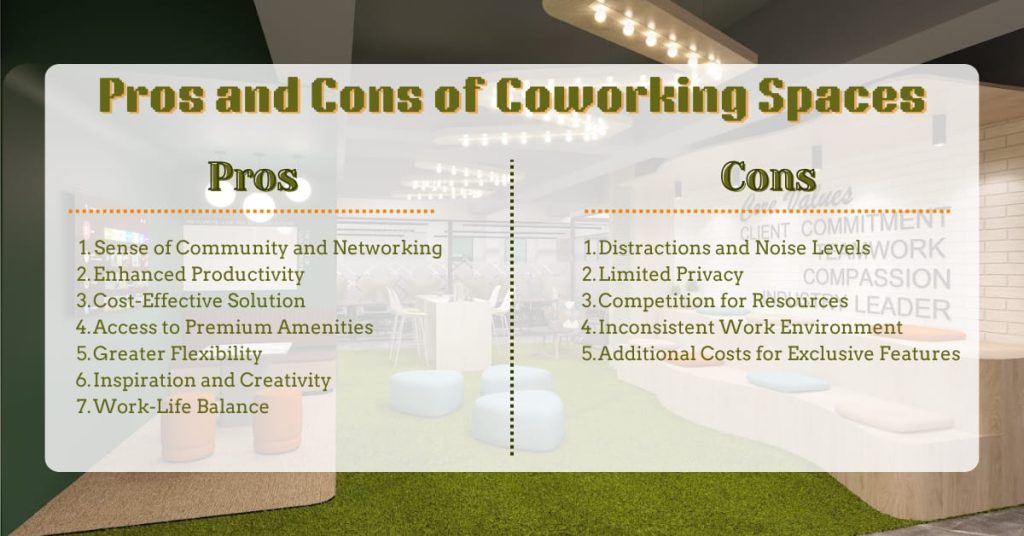The Pros and Cons of Coworking Spaces in 2025
Coworking spaces have become an integral part of the modern workplace, transforming how professionals, startups, and remote workers collaborate and grow. In 2025, shared workspaces are no longer just a trend—they’re a preferred solution for freelancers, entrepreneurs, and enterprises seeking flexibility, networking, and cost savings.
But like any business decision, choosing a coworking office comes with both advantages and challenges. Before you commit, it’s essential to understand the pros and cons of coworking spaces so you can decide whether this model suits your work style and business needs.
What is Coworking?
Coworking refers to shared office spaces where individuals and teams work independently or collaboratively in a professional setting. Unlike traditional offices, coworking fosters flexibility, community, and innovation, often offering everything from hot desks to private cabins and meeting rooms.
These spaces are particularly popular among:
- Freelancers and gig workers
- Startups and small businesses
- Remote employees and hybrid teams
- Enterprises looking for satellite offices
✅ Pros of Coworking Spaces
1. Community and Networking
Coworking creates a sense of belonging. You get to connect with professionals from different industries, attend workshops, and participate in networking events. This environment often leads to collaborations and business opportunities.
2. Improved Productivity
A structured environment reduces distractions compared to working from home. Being around motivated professionals fosters focus and discipline, leading to higher productivity.
3. Cost Savings
Unlike traditional offices with high rents and long-term leases, coworking offers flexible plans—daily passes, monthly memberships, and pay-as-you-go options. It’s budget-friendly, especially for startups and solopreneurs.
4. Access to Premium Amenities
High-speed WiFi, ergonomic seating, meeting rooms, breakout zones, printing services, and unlimited tea/coffee are standard. Some premium spaces even provide gyms, nap rooms, and wellness zones.
5. Flexibility
Need a desk for a day? A private cabin for a week? Or a meeting room for an hour? Coworking spaces provide unmatched flexibility, making them ideal for dynamic work requirements.
6. Inspiration and Creativity
Exposure to diverse professionals sparks fresh ideas. The mix of talent in shared spaces encourages brainstorming, knowledge-sharing, and innovative thinking.
7. Work-Life Balance
For remote workers, coworking creates clear boundaries between home and office, reducing burnout and improving overall well-being.
❌ Cons of Coworking Spaces
1. Noise and Distractions
Open layouts can be noisy. Conversations, phone calls, and foot traffic may disturb those needing deep focus. Private cabins and soundproof booths are solutions, but they often come at a premium.
2. Limited Privacy
Shared spaces mean sensitive discussions or confidential work may not always be secure. Businesses handling confidential data may find this challenging.
3. Competition for Resources
Meeting rooms, parking, or even your preferred desk may not always be available. This can disrupt workflow during busy hours.
4. Inconsistent Work Environment
Every day feels different—new members, changing teams, and varying energy levels. Some thrive in this dynamic setup, while others may find it unsettling.
5. Extra Costs
While coworking is cost-effective, add-ons like dedicated storage, printing, or exclusive meeting spaces may increase overall expenses.
Are Coworking Spaces Worth It in 2025?
The value of coworking depends on your work style. If you thrive in collaborative environments, enjoy flexibility, and want cost savings without the burden of long leases, coworking is a great choice. However, if privacy, stability, and full control over your environment are top priorities, traditional offices or private setups might work better.
🌍 The Future of Coworking Beyond 2025
The industry is evolving fast, and new trends are shaping how coworking is experienced:
- AI-Powered Workspaces: Automated bookings, smart desk allocation, and personalized amenities.
- Niche Coworking Hubs: Industry-specific offices (tech hubs, design studios, wellness-focused workspaces).
- Hybrid Work Support: Flexible packages for companies adopting hybrid models.
- Eco-Friendly Workspaces: Green buildings, renewable energy, and sustainability initiatives.
- Enhanced Amenities: Childcare support, wellness programs, and business growth services.
With over 42,000 coworking spaces expected globally by 2025, the future looks collaborative, sustainable, and innovation-driven.
Frequently Asked Questions About Coworking Spaces in 2025
Question 1. What are the main pros of coworking spaces in 2025?
The biggest pros include networking, cost savings, flexibility, premium amenities, and improved productivity in a structured environment.
Question 2. What are the main cons of coworking spaces?
Cons include noise, limited privacy, competition for resources, inconsistent environments, and extra costs for premium features.
Question 3. Who benefits most from coworking spaces?
Freelancers, startups, remote employees, consultants, and small businesses benefit most due to affordability and flexibility.
Question 4. Are coworking spaces cost-effective compared to traditional offices?
Yes. Coworking avoids high rents, long leases, and maintenance costs, making it a budget-friendly option for businesses of all sizes.
Question 5. Do coworking spaces improve productivity?
Yes. Shared work environments reduce home distractions, foster focus, and create a motivating atmosphere with like-minded professionals.
Question 6. How do coworking spaces help networking?
Coworking hubs host professionals from diverse industries, encouraging collaboration, partnerships, and knowledge-sharing through events and meetups.
Question 7. What amenities do coworking spaces usually provide?
Most offer high-speed WiFi, ergonomic seating, meeting rooms, breakout zones, printing, tea/coffee, and 24/7 security.
Question 8. Are coworking spaces suitable for enterprises?
Yes. Many enterprises use coworking spaces for satellite offices, hybrid teams, and project-based setups without committing to long leases.
Question 9. What are the future trends in coworking beyond 2025?
Trends include AI-powered workspaces, niche industry-specific hubs, hybrid models, eco-friendly offices, and wellness-focused amenities.
Question 10. How do I choose the right coworking space?
Visit multiple spaces, compare costs, amenities, and location, then choose one that aligns with your business goals and work style.
Conclusion : Pros and Cons of Coworking
Coworking spaces in 2025 continue to redefine the way we work. While they offer flexibility, affordability, and networking opportunities, challenges such as privacy concerns and resource availability remain. The decision comes down to your personal and business priorities.
If you’re considering coworking, weigh the pros and cons carefully, visit a few spaces, and choose one that aligns with your goals.
About CO-OFFIZ : Coworking Space in Delhi-NCR
CO-OFFIZ coworking spaces provide startups, SMEs, and enterprises with the ideal environment to thrive. Our modern workspaces across Delhi-NCR, including Noida Sec-63, Gurgaon Sec-58, Preet Vihar, Janakpuri, and NSP, are designed to enhance productivity, collaboration, and growth.
Key amenities include:
- Flexible desks, private cabins, and team cabins.
- High-speed internet, unlimited tea/coffee, and AC comfort.
- Breakout zones, meeting rooms, and professional networking opportunities.
- 24/7 power backup and CCTV security.
With CO-OFFIZ, entrepreneurs and professionals can focus on growth while leveraging a ready-to-use, professional workspace that supports scaling on auto-pilot.
📞 Call us: +91-9971-089-111
📧 Email: info@co-offiz.com
🌐 Website: www.co-offiz.com


